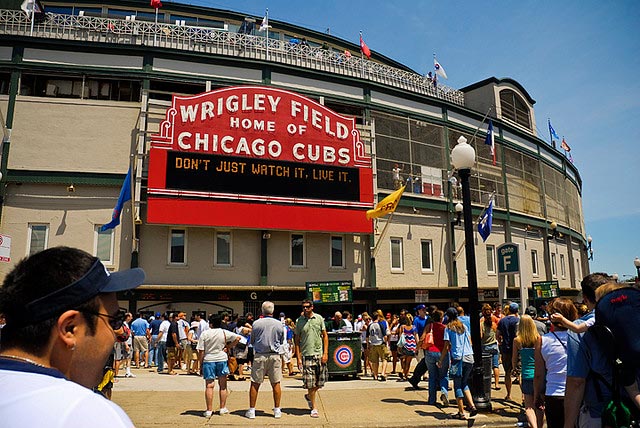Wrigleyville Neighbors Want Answers From Cubs On Congestion, Traffic Flow
By Chuck Sudo in News on Mar 27, 2013 7:15PM
Every year residents and business owners surrounding Wrigley Field gather with representatives of the Chicago Cubs, Festivus-like, for an annual airing of grievances centered on the persistent quality-of-life issues surrounding the ballpark and the ballclub’s community efforts to help remedy them, per city ordinance.
The meeting instead turned into another battle between the Cubs and the community about the club’s long-stalled renovation plan. The Cubs want an answer on their plan by April 1, which has run into a sturdy roadblock in Ald. Tom Tunney (44th). He has repeatedly stated no deal would be in place until the Cubs could answer how their plan, which includes a boutique hotel and a relaxation of Wrigley Field’s landmark status for more late games and sponsorships, will affect the community and especially the rooftop club owners that pour money into his campaign funds.
The neighborhood groups that aren’t rooftop clubs have reasons for concern. They want to know how building a boutique hotel will affect the intersection of Clark and Addision, which is already a mess on game days. The Lake View Citizens' Council, the umbrella organization that brings many of these groups together, have been waiting for a study to show how additional late afternoon and night games would affect traffic around the ballpark. (As if we don’t know the answer.)
Southport Neighbors Association president Jill Peters said at the meeting police need to do more to stop the scourge of limousines idling on side streets during games and the concerts that are happening at Wrigley with increased frequency.
”They're taking up parking spaces and parking in the crosswalks," Peters said, adding that it will become a bigger problem if the team gets more night games, as it wants.
Cubs spokesman Julian Green would not address the April 1 deadline except to say the club was eager to get something done. But it appears as though they’re leaning toward trying to use Rosemont Mayor Brad Stephens’s offer of land in that suburb for the Cubs to develop as a sword. Tribune business columnist Phil Rosenthal wrote in today’s paper that would be the absolute wrong thing to do.
The threat of abandoning that equity and investment for a new ballpark in Rosemont, as has been floated of late, is undercut by aversion to that risk. Even if the resulting edifice proved an adequate replica, the roar of O'Hare arrivals and departures drowning out organ music notwithstanding, it couldn't be the same. Part of Wrigley Field's appeal, nestled in a real community of bars, restaurants and apartments, is that it is real.In that sense, the Cubs are the victims of their own hype. All those years of touting Wrigley as a baseball cathedral — and a more reliable attraction than the also-ran teams sent out of the third-base dugout to play in it for decades — have masked its deterioration and lack of modern amenities.
The Rosemont feint, dangerous as it might be, would have more credibility if the Ricketts family was openly exploring a variety of alternative sites. But they aren't actively floating ideas such as a development on Chicago's West Side that could also include commercial and residential opportunities.
There’s also plenty of money to lose. Forbes released its list of the richest teams in Major League Baseball and listed the Cubs as the fourth-most valuable franchise, at a cool $1 billion.
